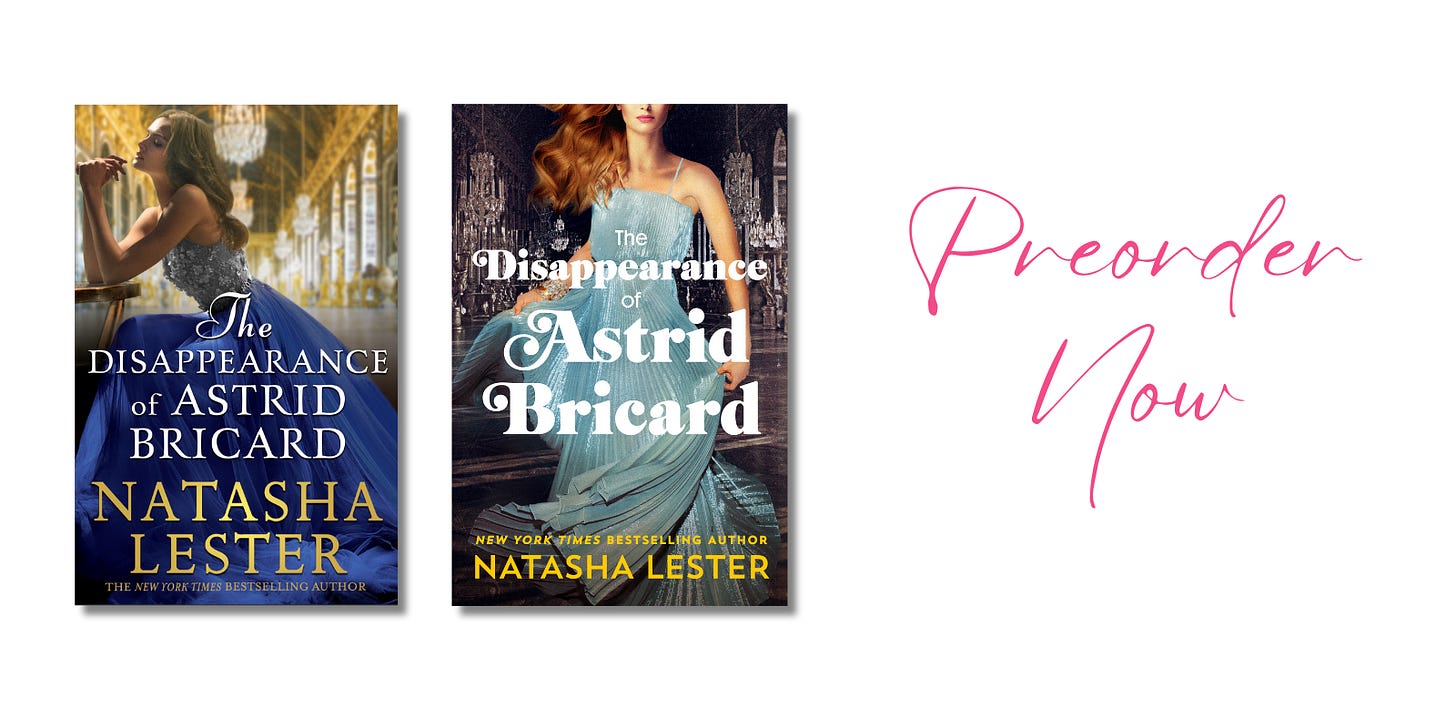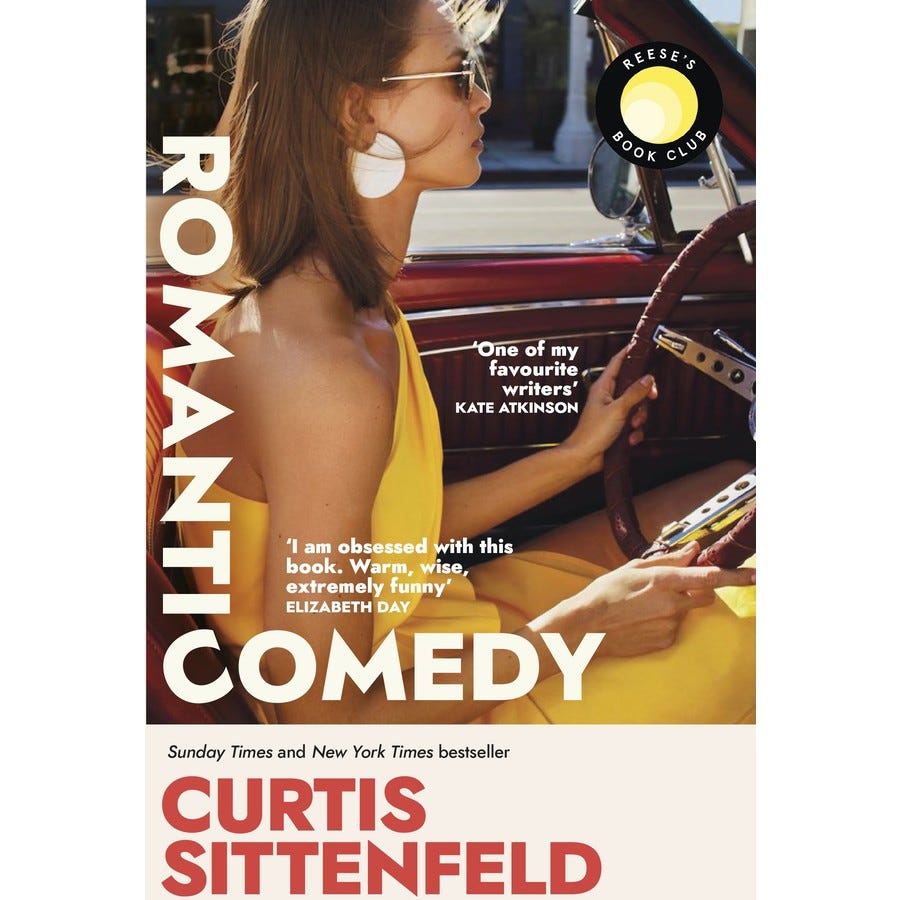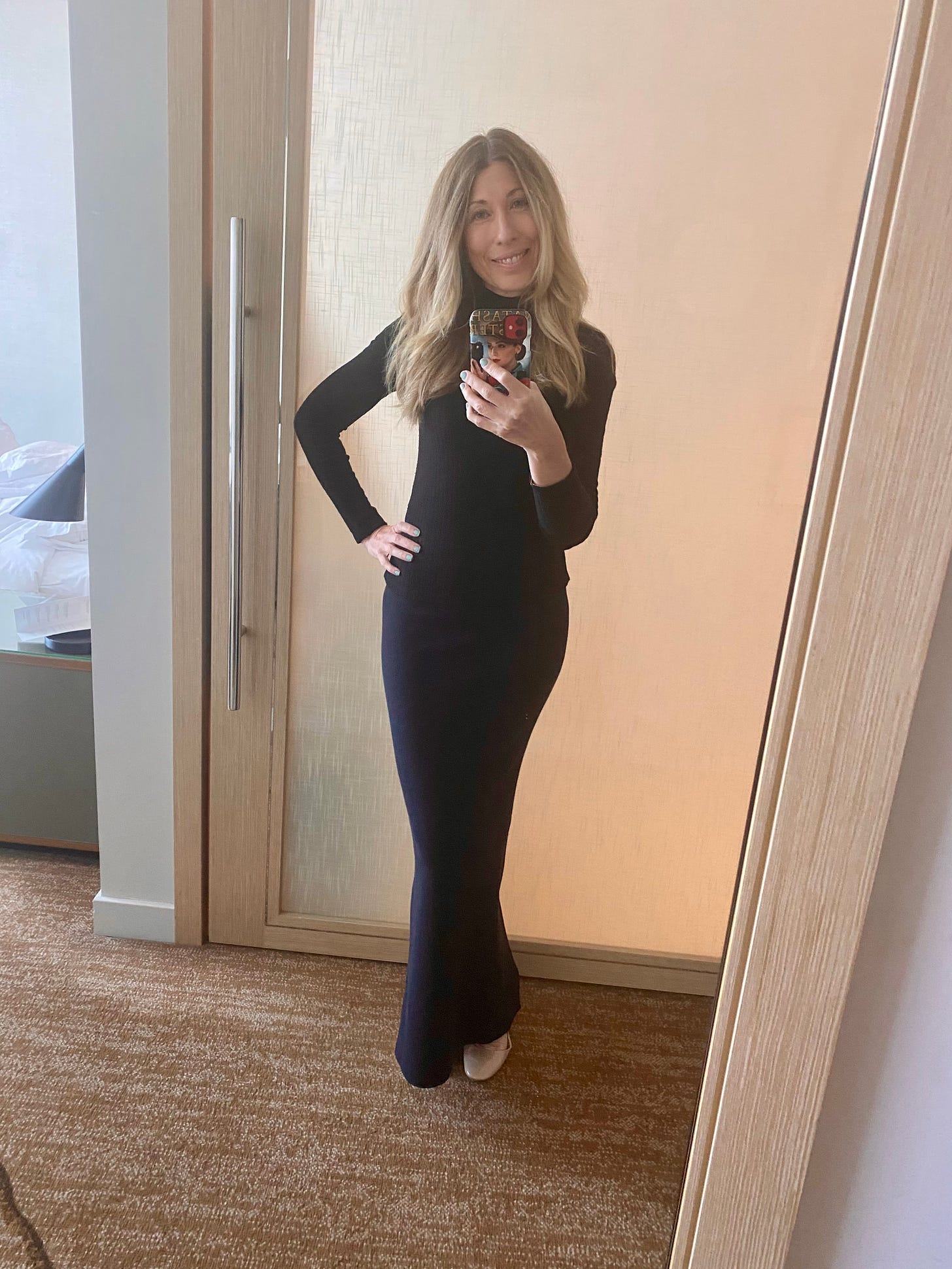July's Bijoux List: On Self-Doubt (and realising mine is much worse than I'd thought)
This month's Bijoux List jumps from self-doubt to romantic comedies to sobbing on aeroplanes! What an eclectic month!
I’m back for another Bijoux List, my monthly accumulation of thoughts about things I’ve loved, pondered and experienced over the course of the past thirty-odd days. It’s a long one, so let’s dive straight in to July’s Best Moment.
1. July’s Best (and Worst) Moment
Over the years, I’ve heard so many people talk about Julia Cameron’s book The Artist’s Way. Not just writers, but people from all walks of life. Mostly, they’ve raved about it, and talked about their morning pages as if they’re a transformative experience. Despite all the hype, I’d never read The Artist’s Way — until a couple of weeks ago.
Why have I never read it? Why have I started now? And how am I finding it?
To answer the first question, I guess it was partly because of the hype. Could anything really be that good? (except French cheese, which is worth every bit of hype!) I was also wary because I had the sense that it was all a bit of a cult.
I knew too that Julia Cameron talked about God regularly in the book. I went to Catholic schools and was made to go to church every Sunday, and my experience of those Catholic schools and churches was that most things were sinful, any form of pleasure was bad, women’s bodies were especially shameful, sex was almost unspeakable, and that there was a man hovering above me, ready to rain down hellfire and damnation if I so much as looked at the cover of Flowers in the Attic, let alone read it. So the idea of a book about creativity referencing God was a complete turnoff for me. (I absolutely understand that many people don’t see God this way. Perhaps I went to the wrong schools and the wrong churches, but my experiences mean I have difficulty with anything that talks about God as a positive force.)
Onto my second question — so why am I reading it now? I always like to do things that help me become a better writer. I’ve carried a niggling concern for at least the last year or two that perhaps writing a book every year could drain my creativity completely away – if I let it. I’d also just finished a second draft of The Secret Life of Marie-Madeleine that’s at least 20,000 words too long and I was really stuck for ways to reduce it, beyond going in and slicing multiple sentences out of every chapter.
I wanted to get a better sense of what the book needed, rather than just what might be cut. I want to make it the best story possible – while still adhering to a reasonable word count. And Kerri Maher, a friend of mine, had suggested to a group of us that we do The Artist’s Way together. I couldn’t join in because the timing didn’t work for me, but part of my brain said, if so many people talk about this book, why don’t you give it a try? At least read a chapter or two; you’ve got nothing to lose.
So, two weeks ago, we went down to our brand-new holiday house by the sea and I began. How am I finding it?
My Version of The Artist’s Way
First up, I’m doing some of the tools my own way. For example, the fabled “morning pages”. You see, the other thing that’s always made me not want to do The Artist’s Way is the sense that the morning pages feel like something designed for privileged people. A mum who has to get three kids out the door to school every morning has very little time to sit down quietly and write three pages.
Of course, Julia Cameron suggests getting up half an hour earlier, but I already get up at 6am and I’m the kind of person who needs eight hours sleep every night. My writing suffers if I don’t. Getting up earlier is not something I want to do – and if I don’t want to do something, I knew I wouldn’t. And I’d be failing from the outset.
So I removed that barrier. I decided that so long as I did those three morning pages first when I sat at my desk, before I did any other work, then that would be fine. Also, every time I read the word God in Julia Cameron’s book, I would change it to goddess or muse. Both are concepts I relate to. And, indeed, Julia Cameron acknowledges that you should just go ahead and substitute whatever works for us.
As well as morning pages, there are things like affirmations, which I’ve done before, and then there are a whole series of exercises to work through each week. I’m only up to the end of week two, so my impressions are early.
Discovery No. 1 – I’m Kind of Mean to My Writing Self
The first week I found the morning pages much more helpful than I expected. Initially, the idea of sitting down and writing out three pages of whatever was top of my mind seemed unlikely to prove useful. But I soon realised I have a lot of thoughts running around my head in the morning, and that setting them down on paper gives me more of a sense that I’ll get them all done. I guess I’ve always been someone who likes a to-do list, and perhaps the morning pages are an extension of that.
I’ve also used the morning pages to probe some of the things that have come up for me in the weekly exercises, which are actually the things I’m finding the most useful.
I’ve always understood that every writer carries self-doubt with them, and that the thing to do is to acknowledge it, but not to get caught up in the self-doubt. I’ve also always been aware of the havoc that self-doubt can wreak with a writer’s confidence and productivity – and I thought that being aware meant that I was doing a good job of managing my self-doubt.
I think I may have been fooling myself.
In doing the exercises in the book, I’ve realised that, actually, there are a couple of negative reviews of my books that have taken up residence in my heart like school bullies and that, over the course of my writing day, they regularly throw nasty words at me like particularly accurate spitballs. If you want to read those reviews, you can do so here and here, but, in summary, I write formulaic and gooey glamscapes with too many adjectives and too much romance.
Yes, I herewith confess to loving adjectives and romance. What a crime against fiction!
But it’s all very well to laugh at myself because, it turns out – the joke’s on me. Working through the exercises and, in particular the “blurts”, I became very aware of the things I regularly find myself thinking as I write.
That my writing is bad. That I should write less about love if I want to be taken seriously, that my characters definitely shouldn’t have sex if I ever I want to be taken seriously (except that they always seem to end up in a bed together eventually!), that my prose is too lush. That I’m undeserving of my success because I write so-called commercial fiction (which is another way of saying I write trash) and only people who write award-winning books are deserving of success.
What To Do About My Inner Bullies?
So yes, there’s a lot to unpack in all of that. Those are some fairly hefty self-doubts to carry around when you’re trying to pour your whole heart and soul into a book.
Many people assume that self-doubt lessens as you write more books. I know I’ve said in the past that I think it actually becomes worse, but I never really thought deeply about how that applied to me. For me, it absolutely has become worse. Because there are so many expectations on me now: from agents, publishers, readers, reviewers, myself, my family, my bank account etc.
As for how to shut up my inner bullies – I don’t yet know. I’m only up to week two! But I think just realising how much I’ve let myself take on and believe others’ words is a start. So I’ll keep going with The Artist’s Way and let you know how it all unfolds.
Have you read the book? What was your experience like? Let’s discuss in the comments.
2. Amazing Woman of the Month
Normally section two of the Bijoux List is where I talk about an amazing woman from history, but section one is already so long that I will instead refer you to this piece I wrote about real life art-spy Rose Valland for the Australian Financial Review. Enjoy!
3. Fashion Fun
Carrie Bradshaw from Sex and the City is unarguably a fashion icon. I was one of many people who watched the show religiously through the late nineties and early noughties. So I found this profile of Sarah Jessica Parker fascinating and thought it did an excellent job of contrasting the many faces we all have, celebrities included.
I want to pair this article with this absolutely hilarious summary by Drinks With Broads of the first two episodes of the new season of And Just Like That. I started watching season one and got bored about three episodes in. I haven’t watched the episodes they’re referring to here, but I don’t need to! Their take is much funnier than any episode could ever be!
What I found most interesting is their assessment that Carrie is becoming too much like SJP, and that’s to the TV show’s detriment. And on reading the profile piece in the New Yorker, it sounds like they might be right.
The brilliance of Carrie was always her mix of vulnerability and her ability to articulate exactly what everyone is thinking, but doesn’t dare say (combined with her great outfits, of course!). If she stops daring to say, then a big part of her magic is gone.
So hopefully, while Carrie’s hat choices and scripts may have gone a little awry, things will get back on track as the season progresses. I’d hate to think of such an iconic character – in one of the very few television programmes about women in their fifties, which is something to be celebrated – losing her spark.
4. Top 5 Books About …
I’ve just finished Curtis Sittenfeld’s Romantic Comedy and it was brilliant. I love her books so much – she is unreservedly one of my favourite writers. I’m going to check out the only one of hers I haven’t yet read, Prep. Have you read that one?
In honour of her book, this month’s top 5 is, of course … romantic comedies! Let me know your faves in the comments.
Romantic Comedy by Curtis Sittenfeld
Book Lovers by Emily Henry
Eligible by Curtis Sittenfeld
The Hating Game by Sally Thorne
The Flat Share by Beth O’Leary
5. What I Bought
This skirt from Jac + Jack has taken me from boardroom meetings with my publisher to dinners and holidays and I love it so much I bought it in cream too! It doesn’t crease, it folds down super small and it’s on sale right now too – you’re welcome!
6. Recommendations and Links
What I’m Watching: I do NOT recommend that you watch 1883 on an aeroplane. I mistakenly did this on the way to Hawaii and, dear reader, I sobbed! 1883 is one of Taylor Sheridan’s Yellowstone extensions and I liked it much better than its progenitor. Main character Isabel May is glorious and I want her to star in the movie of The Disappearance of Astrid Bricard (we can all have dreams, right?!) My only complaint is that there’s a major plot thread that somehow gets dropped for the last couple of episodes. It is truly brutal viewing, but it’s also exquisite. Go watch it – just not on a plane!.
What (Else) I’m Watching: I had to take breaks from the aeroplane-sobbing every now and again so I tried Succession for the third time. I don’t know why I didn’t like it the first two times I watched the first episode, but I’m now, like the rest of the world, hooked! I’m only up to Season Two so I have no idea what will happen by the end, just that I’m sure it will be dastardly!
What I’m Reading: I just started Yellowface by R.F. Kuang and, once again like the rest of the world, I’m loving it! There are so many truths about the publishing industry and about being an author in the book, truths that nobody dares say out loud, yet Kuang has given them to a character so she can say them! I can’t wait to see how this one turns out. Have you read it? Let me know in the comments!
Links: I’m writing about WWII, things that happened more than eighty years ago, and then I read this piece by Lauren Wolfe from Chills and I got chills of horror. We don’t learn, we don’t change and people keep dying. Those poor boys.
More links: There’s nothing better than reading a simply glorious piece of writing and this one by Ariel Lawhon is divine.
And now it’s over to you! If you’re a writer, how do you deal with self-doubt? For everyone else, have you ever done The Artist’s Way and how did you find it? What are you reading and watching? Let’s talk in the comments!







I'm a huge Julia Cameron fan. She changed my life. Always pleased to hear about others giving The Artist's Way a go. I just did a video about my relationship with Morning Pages on Youtube: https://www.youtube.com/watch?v=kbqkVWylvng
Loved The Artist’s Way by Julia Cameron : wasn’t really bothered by the God references, just continued through and felt the benefit. I should reread it.